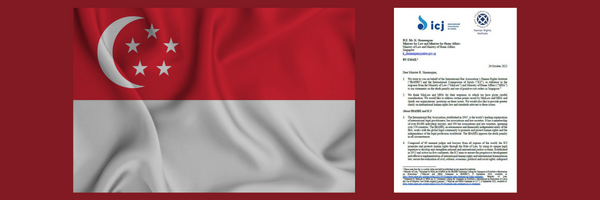Singapore: IBAHRI and ICJ respond to Ministry of Law and Ministry of Home Affairs on the death penalty and cost sanctions

In an open letter to Singaporean authorities published today, 27 October 2022, the International Bar Association’s Human Rights Institute (IBAHRI) and the International Commission of Jurists (ICJ) reiterated that Singapore’s practices concerning the death penalty fail to comply with international human rights law and standards.
The joint open letter was sent to Minister K Shanmugam, Minister for Law and Minister for Home Affairs. It responds to the statements published by Singapore’s Ministry of Law (MinLaw) and Ministry of Home Affairs (MHA) on 8 September 2022 to the IBAHRI and to the ICJ.
The IBAHRI and ICJ have previously issued statements calling on the Singaporean authorities to establish a moratorium on the use of the death penalty, and to cease using cost sanctions against lawyers representing death-row inmates.
In the open letter, the IBAHRI and ICJ underscored that:
- Capital punishment is never permissible for drug-related offences under international law because drug offences do not meet the ‘most serious crimes’ threshold;
- Imposing cost sanctions on death row lawyers has obstructed the right of death row inmates to effective legal representation and access to justice;
- Discrimination also includes indirect discrimination, where an action or policy has an unjustifiable disparate impact upon a group based on a protected characteristic; and
- There is no evidence that the death penalty deters crimes more effectively than any other form of serious punishment.
The IBAHRI and ICJ called on Singapore to join the worldwide trajectory towards abolition of the death penalty, starting with an immediate introduction of a moratorium on all sentences and executions with a view to abolition in line with repeated Resolutions of the UN General Assembly calling for such measures.
The IBAHRI and ICJ emphasised that they remain available for constructive dialogue and engagement with all relevant stakeholders, such as representatives of MinLaw and MHA, with the aim of contributing to Singapore aligning its laws, policies, and practices with international human rights law and standards with regards to its use of the death penalty.
The IBAHRI and the ICJ oppose the death penalty under any circumstances as a violation of the right to life and freedom from cruel, inhuman, or degrading punishment.
The joint open letter can be downloaded here.
ENDS
For further information/interview requests, please send an email to: IBAHRI@int-bar.org
Notes to the Editor
- On 15 May 2008, the IBAHRI Council adopted its Resolution on the Abolition of the Death Penalty, which considers, inter alia, the clear trend towards viewing the death penalty as a breach of international human rights standards, as well as committing the IBAHRI to actively promoting the abolition of the death penalty.
- Click here to find out more about the IBAHRI’s work on the abolition of the death penalty.
- Related links:
- The International Bar Association’s Human Rights Institute (IBAHRI), established in 1995 under Founding Honorary President Nelson Mandela, is an autonomous and financially independent entity, working to promote, protect and enforce human rights under a just rule of law, and to preserve the independence of the judiciary and the legal profession worldwide.
- Find the IBAHRI (@IBAHRI) on social media here:
- The International Bar Association (IBA), the global voice of the legal profession, is the foremost organisation for international legal practitioners, bar associations and law societies. Established in 1947, shortly after the creation of the United Nations, it was born out of the conviction that an organisation made up of the world's bar associations could contribute to global stability and peace through the administration of justice.
The IBA acts as a connector, enabler, and influencer, for the administration of justice, fair practice, and accountability worldwide. The IBA has collaborated on a broad range of ground-breaking, international projects with the United Nations, the European Parliament, the Council of Europe, The Commonwealth, the Organisation for Economic Co-operation and Development (OECD), the World Trade Organization, the International Monetary Fund and the World Bank, among others. - Find the IBA(@IBAnews) on social media here:
Website page link for this news release:
Short link: tinyurl.com/mrhart7f
Full link: www.ibanet.org/Singapore-IBAHRI-and-ICJ-respond-to-Ministry-of-Law-and-Ministry-of-Home-Affairs-on-the-death-penalty-and-cost-sanctions